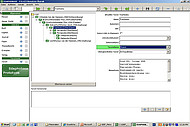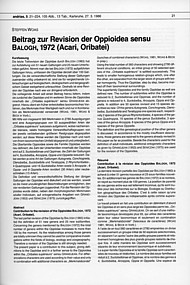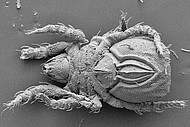EDAPHOBASE - a soil organism data warehouse
In this project, funded by the German Federal Ministry for Education and Research (BMBF) we developed a non-commercial database on soil organisms (up to now including data on Chilopoda, Collembola, Diplopoda, Enchytraeidae, Gamasina, Lumbricidae, Nematoda, Oribatida integrated in the Global Biodiversity Information Facility (GBIF) network.
While most existing databases on edaphic organisms contain museum or private collection data, providing information on a variety of species from widely dispersed collecting localities, EDAPHOBASE combines data on taxonomy, zoogeography, and ecology of these organisms in the most comprehensive manner. Data were derived from publications but also from collections and unpublished field studies contributed by cooperating soil ecologists at universities and museums all over Germany. At present, the focus is on Germany and neighbouring countries, but it is possible to incorporate data from other European countries in the future. Data types comprise up-to-date taxonomic thesauri, geographical references, ecological indices, soil composition, vegetation, meteorological data, sampling and extraction methods, quantity of collected organisms, identification methods, preparation techniques, and behavioural data. The data quality in EDAPHOBASE is guaranteed by critical evaluation of the data by taxonomic experts prior to data input. EDAPHOBASE offers a wide range of tools for data inclusion (client, GIS-tool, semi-automatic literature analysis) and data exploration. Simple queries are possible as well as more sophisticated analyses of different data groups concerning, e.g., geographical distribution or preferences and tolerances with regard to specific niche parameters or effects of anthropogenic perturbation. Furthermore, prognostic tools are provided to discern changes within soil biocoenotic assemblages as a reaction to modifications in land-use techniques or effects of climatic change. We expect EDAPHOBASE to multiply the availability and quality of soil zoological data for research and application in Germany. EDAPHOBASE has been built by software engineers and soil scientists at Senckenberg Museum in Görlitz, Germany in cooperation and with contributions of scientists from the NaturBMBFal History Museum in Karlsruhe and ECT Oekotoxikologie GmbH, Flörsheim. The project is funded by the German Federal Ministry of Education and Research (BMBF)(2009-2012). More Information under: www.senckenberg.de and www.plazi.orgSelected Publications
- Weigmann G., Horak F., Franke K., Christian A. (2015):
-
Verbreitung und Ökologie der Hornmilben (Oribatida) in Deutschland (Acarifauna Germanica - Oribatida).
Peckiana 10: 1-171

- Jänsch S., Steffens L., Höfer H., Horak F., Roß-Nickoll M., Russell D., Toschki A., Römbke J. (2013):
-
State of knowledge of earthworm communities in German soils as a basis for biological soil quality.
Soil Organisms 85(3), Görlitz: 215-233

- Römbke J., Jänsch S., Höfer H., Horak F., Roß-Nickoll M., Russell D., Toschki A. (2013):
-
State of knowledge of enchytraeid communities in German soils as a basis for biological soil quality assessment.
Soil Organims 85(2), Görlitz: 123-146

- Raub F., Stierhof T., Höfer H. (2012):
-
Vom Karteikasten zu modernen Informationssystemen - die Entwicklung der zoologischen Datenbanken am Staatlichen Museum für Naturkunde Karlsruhe.
Carolinea 70, Karlsruhe: 91-101


Dr. Hubert Höfer, Dipl.-Biol.
Phone: +49 721 175 2826
E-Mail: hubert.hoefer[at]smnk.de

Dr. Thomas Stierhof, Dipl.-Biol.
Phone: +49 721 175 2823
E-Mail: thomas.stierhof[at]smnk.de









